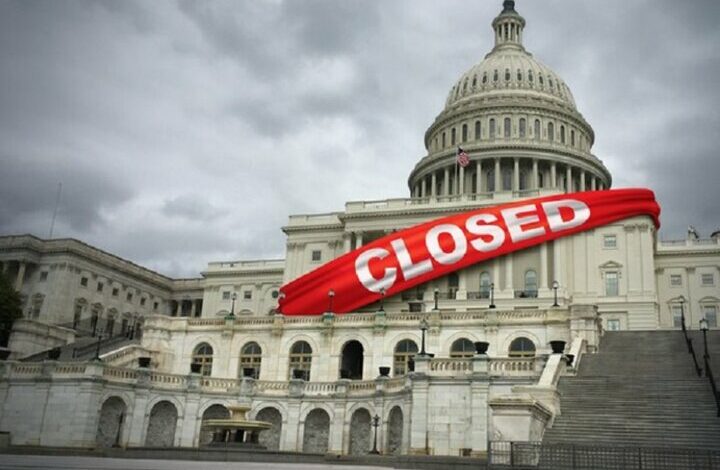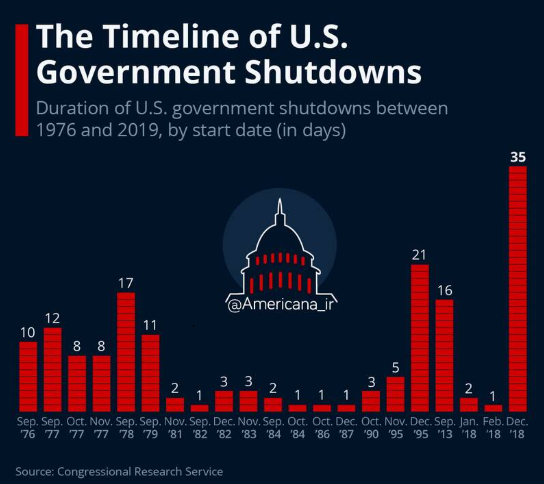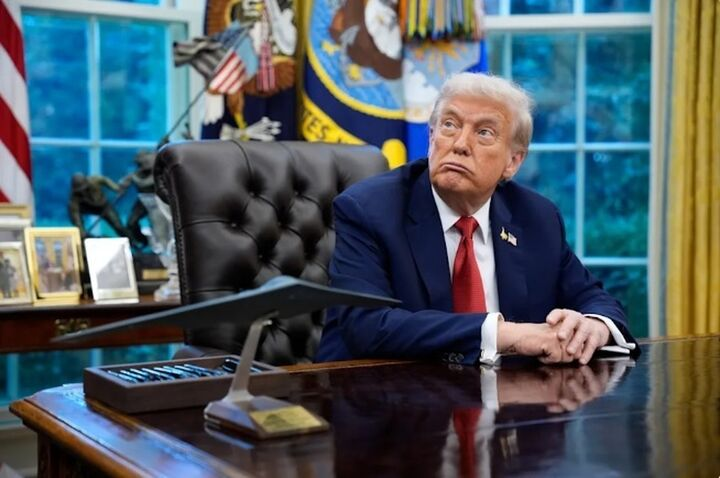U.S. Government Shutdown Crisis: Will the 35-Day Record Be Broken?

mehr News Agency, International Desk, Hassan Shokouhi Nasab: In the early hours of Wednesday, October 1, 2025, following Congress’s failure to approve a budget bill, the federal government of the United States entered a widespread shutdown that has now lasted nearly three weeks. This shutdown ranks as the third longest in U.S. history and has caused suspension of government services, mandatory leave for hundreds of thousands of federal employees, and widespread disruption across federal agencies.
Several observers and officials-including House Speaker Mike Johnson-have warned that this could become the longest government shutdown in U.S. history. Historically, Bill Clinton’s governance held the previous record with a 21-day shutdown. However, during 2018-2019, Donald trump’s administration set a new record with a 35-day closure; breaking this record under Trump’s second term is now considered plausible.
Causes and Roots of Trump Administration’s Government Shutdown
The current U.S. government shutdown stems from several key issues outlined below.
Political Deadlock over Budget
the current shutdown began when the Senate repeatedly failed to pass two partisan budget bills. While the House approved a temporary funding resolution by a narrow margin (217 to 212 votes), no agreement was reached in the Senate before midnight on October 1st.The main sticking point centers on democrats’ insistence to extend enhanced subsidies under the Affordable Care Act (ACA),which are set to expire at year-end 2025. These subsidies help about 22 million Americans reduce healthcare costs but would cost approximately $1.5 trillion over ten years if renewed.
Policies Aiming at Reducing Government Size
Donald Trump returned to office for his second term in January 2025 with an aggressive approach toward shrinking federal government size. He has publicly stated he views this shutdown as an opportunity to cut funding for progressive projects and streamline bureaucracy. Ras Woot-the White House Office of Management and Budget director-plays a pivotal role in this strategy by informing Republican lawmakers that layoffs may begin during the furloughs.
Woot also announced nearly 10,000 federal employees might receive layoff notices soon. Under trump’s direction framed as improving governmental efficiency-but criticized as politically motivated actions-it was reported that by August around 300,000 federal workers could leave their jobs by year-end; approximately 80% voluntarily, leaving roughly 60,000 involuntary layoffs expected.
Domestic and International Impacts of Shutdown
The sharpest domestic effect falls on federal workers: estimates from Congress’s Budget Office indicate around 750,000 employees are furloughed without pay until budgets are passed while another estimated 700,000 essential personnel continue working without paychecks pending resolution.Recently-for first time since past closures-federal workers have missed paycheck dates entirely causing severe financial strain on them and their families.
The closure disrupts numerous public services nationwide including meaningful problems managing air traffic control systems.
The Aerospace Industries Association warns prolonged delays hinder new programs innovation while slowing Federal Aviation Administration operations.
Additionally passports issuance along with visa processing faces major backlogs.economically this crisis hurts growth projections: analysts estimate it could reduce GDP growth by roughly 0.15 percent, potentially rising if stalemate continues longer.
Meanwhile fiscal deficits have ballooned-set at about $1.775 trillion for FY2025-the Trump administration argues these justify urgent cuts thru downsizing efforts.
One controversial aspect involves halting or suspending infrastructure project funding primarily directed toward Democrat-led cities.
On day one alone Woot announced suspension totaling close to $18 billion earmarked for New York projects including Hudson Tunnel rehabilitation as well as Second Avenue Subway construction.Funding cuts also affected nearly $8 billion targeting climate-related projects across sixteen states favoring kamala Harris in last elections alongside more than $2 billion worth allocated for chicago area infrastructure suspended.
Shutdown repercussions extend beyond domestic affairs affecting foreign policy influence globally:
Despite crisis conditions limiting full diplomatic functionality amid many State Department staff placed on forced leave,
President Trump met Ukrainian President Volodymyr Zelenskyy at White House recently,
and held telephone talks with Vladimir Putin demonstrating diplomatic activity amid governmental paralysis.
Moreover international aid programs military operations respond poorly under these constraints weakening America’s ability to act during global crises potentially undermining its alliances’ trust internationally.
Examining Three Possible Scenarios Ahead
Nearing three weeks into closure there remain three likely ways out:
Bipartisan Agreement:
The most probable solution involves bipartisan senators reaching consensus providing temporary funding coupled with guarantees enabling further discussions about renewing ACA enhanced subsidies yet no significant progress has been reported so far.
Sides Backing Down:
If public pressure or economic consequences intensify sufficiently one party might retreat; however given Senate failures spanning ten unsuccessful votes passage seems unlikely currently.
Status Quo Continues:
If gridlock persists government closure risks equaling or surpassing prior records such as historic thirty-five days seen during late-2018 through early-2019 administrations.
The situation epitomizes deep political divisions transcending mere budget disputes revealing bipartisan incapacity prioritizing national interest over party lines.
Trump uses shuttered operation leverage pursuing administrative downsizing goals accepting steep social economic costs evidenced through infrastructure funding suspensions Democratic cities largescale layoff intents plus curtailment public services.
Conversely Democrats’ unwavering stance defending ACA subsidy extensions affecting millions underscores unwillingness sacrificing critical health benefits closing political brinksmanship unresolved..
Ultimately long-term consequences stretch across economics politics society foreign relations:
Economically extended closures amplify damage reducing GDP compounding service interruptions eroding public confidence politically risking midterm presidential contests historically punitive voter backlash toward party blamed socially fueling discontent from workforce interruptions diminishing institutional trust internationally eroding alliance reliability inviting competitor advantage exploitation..




